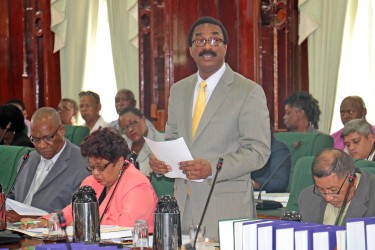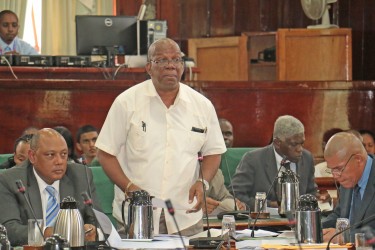In the absence of the opposition PPP/C, government yesterday tabled its first five bills in the Eleventh Parliament including one to reduce the benefits of former presidents and the updated anti-money laundering legislation.
The APNU+AFC coalition government, unlike the previous PPP/C administration, would not have a problem passing these bills as it holds a one-seat majority in the National Assembly. The first bill to be laid in the House was the Constitution (Amendment) Bill 2015 which amends the Third Schedule relating to Article 222A of the Constitution to provide financial autonomy to certain entities such as Parliament and the Guyana Elections Commission (GECOM). While in opposition, APNU and AFC had sought to have the Donald Ramotar administration pass this bill but was unsuccessful.
The Bill was Attorney-General Basil Williams’ first as minister and he also tabled the Anti-Money Laundering and Countering the Financing of Terrorism (Amendment) Bill 2015. The PPP/C has criticized this version of the bill saying that it is non-compliant with international requirements.

Former Attorney General and PPP Executive Anil Nandlall on Wednesday stated that with the proposed amendments to the PPP/C’s 2013 version, the bill is prone to “contamination” by Politically Exposed Persons (PEP). He argued that amendments to the 2013 bill seeking to have the Director and staff of the Financial Intelligence Unit (FIU) appointed by politicians in the National Assembly went against the warning about PEPs by the global watchdog group, the Financial Action Task Force (FATF).
Minister of State Joseph Harmon, in response, had stated that the amendment was not put there for cheap political value but is serious business.
The PPP/C’s version of the anti-money laundering bill had failed to gain the support of APNU and the AFC because both of those groups wanted more robust legislation and arrangements to ensure the prosecution of those engaged in money-laundering. At the committee level, APNU and the AFC had circulated their own version of the bill which did not find favour with the PPP/C.

Another bill tabled yesterday, this time by Minister of Finance Winston Jordan, also his first, was the APNU+AFC version of the Former Presidents (Benefits and other Facilities) Bill. One version to cap the benefits of former presidents was passed in the last parliament by APNU and AFC using their one seat majority but then President Donald Ramotar had refused to assent to it.
Yesterday, Prime Minister Moses Nagamootoo said that the amendments were intended to secure the “integrity of public funds, that it is properly and judiciously spent and not lavished out to those who have served in high positions of the presidency but that there should be a cap on how much is considered to be enough.”
“That, in fact, is good news for the people of the country at a time when we all have to be cutting the corners trying to make ends meet and to be able to secure the treasury from a lot of incursion into it…” he said while adding that the bill would show Guyanese that taxpayer’s monies are being spent judiciously.
Among the provisions of the 2012 bill which was piloted by then opposition parliamentarian Carl Greenidge, was a $5000 per month cap each for water, electricity and telephone services at the residence of a former president in Guyana. The 2015 Bill, however, increases this amount to $25 000 each per month for water, electricity and telephone services.
Also read for the first time was the Fiscal Management and Accountability (Amendment) Bill and the Local Government (Amendment) Bill 2015 which aims to amend the Local Government Act. In the 10th parliament, the then opposition APNU and AFC had been attempting to have the Local Government Minister divested of certain powers as it relates to local government. The latter bill was tabled by Minister of Communities Ronald Bulkan while Minister Jordan tabled the Fiscal Management amendment bill.
Decorum
In his second sitting as Speaker of the National Assembly, Dr Barton Scotland pointed out that the proceedings of the House are now being transmitted live to members of the public and called on MPs to conduct themselves with decorum and respect.
He told the parliamentarians that by electing him, they have placed him in a position of high responsibility and he has to discharge very important duties. He expressed hope that his conduct would serve to encourage and enable members to feel that he strives to maintain the highest tradition of dignity and decorum in the National Assembly while remaining obedient to the Standing Orders. “I trust…that as a consequence, honourable members would join me in this noble endeavour,” Scotland said.
He asserted that there is much work to be achieved in this Parliament and all must remain steadfast as they work towards completing the task. “The public who has sent us here and who look to us to serve them faithfully and will now have an open window into our proceedings, let us determine by our treatment of matters that we are committed to the efficient discharge of all matters [with] respectful interaction among all members,” Dr Scotland said.
Prime Minister Nagamootoo endorsed the Speaker’s call for good conduct by members adding that because of the fact that the public can now witness from outside, what is happening in Chambers, they need to show the Guyanese people that their mandate has not been misplaced.
“That not only are we here to do their business, but we are here to do their business with good decorum, sobriety, respect for each other and also to do so with commitment for the purpose to which this Assembly has been established,” he declared.
He called on his colleagues to use the Parliament to promote democracy since it is important for development.
“This is not the place for selfishness, petty games and vindictiveness. To carry out effectively its functions, Parliament must be a true deliberative body and with a strong committee system. All major legislation coming before this Assembly must be thoroughly examined and there must be prior consultation with those whose interests are directly involved,” the Prime Minister said.





